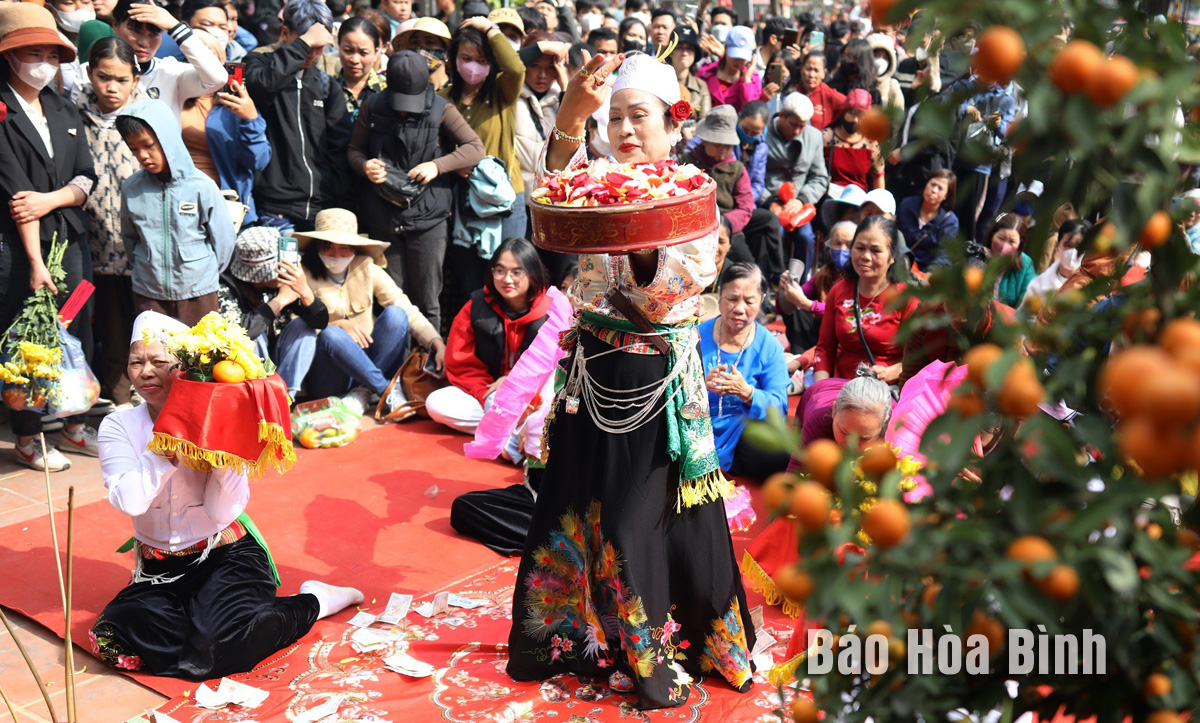
Within the framework of the Tien Pagoda Festival in Lac Thuy district in 2024, after the opening ceremony, a folk-art exchange program took place including Performing the traditional musical instruments, Muong gong art, folk dancing and singing, Chau Van singing... of the clubs preserving Muong ethnic cultural identity of Ba Hang Doi town, Hung Thi, Phu Thanh, Phu Nghia communes, together with the Meritorious Artisans Nguyen Manh Tuan, Tran Manh Hung... at the stage of Tien pagoda.

Demonstrating
the worship of Tam Phu Mother Goddess at Tien Pagoda Opening Ceremony in 2024.
In
particular, the performance of the traditional Hau Dong ritual recreated
Vietnamese Tam Phu belief in a performative nature, recreating the beauty and
highlight of Dam Da Tien Mau Pagoda, which is inseparable from the form of
belief for the worship the Mother Goddess.
This
type of performance plays a central role in Mother Goddess worship, clearly
expressing the traditions and ethics of the nation. The Vietnamese belief in
worshiping the Tam Phu Mother Goddess has been recognized as an intangible
heritage of humanity. This is a beauty in the folk beliefs, which Vietnamese
people have passed down for many years.
In
particular, the belief for Mother Goddess worship in Hoa Binh has interference
with the cultural beliefs of Viet Muong people. With the complex of Dam Da Tien
Mau Pagoda, there is the relic of Au Co Mother, which can lead to a Mother
Goddess in the Tam Tu Phu and towards the peace and kindness for the community.
Dam Da Tien Mau Pagoda is a complex of religious preservation, one of the major
relics of Hoa Binh province that has preserved the customs and practices of
Muong ethnic people. The belief in worshiping Tam Phu Mother Goddesses has
penetrated deeply into the life of the community, that is praying for the peace
in the country and people, good rain and wind.
Tien
Pagoda Festival in Lac Thuy district in 2024 has been upgraded to a provincial
scale, contributing to enhancing the value of this belief as the beauty of
humanity's intangible heritage. Especially the festival helps conserve and
preserve the culture of the ancient and present Muong people. At the same time,
it has been contributing to the successful implementation of the Project on
Preserving and promoting the cultural values of Muong ethnic group and "Hoa
Binh Culture” for the period of 2023 - 2030.
With an increasingly vibrant and widespread emulation movement aimed at building cultured residential areas and cultured families, Yen Thuy District has been making steady progress toward improving both the material and spiritual well-being of its people, while fostering a civilized, prosperous, beautiful, and progressive community.
Once lacking recreational spaces and community facilities, Residential Group 2 in Quynh Lam Ward (Hoa Binh City) has recently received attention for the construction of a new, spacious, and fully equipped cultural house. The project followed the model of state support combined with public contributions in both labor and funding.
The "All people unite to build cultural life" movement, which has been effectively integrated with Kim Boi district’s socio-economic development goals, is fostering a lively spirit of emulation across local residential areas, hamlets, villages, public agencies, and enterprises. In addition, through the initiative, traditional cultural values are being preserved and promoted, while community solidarity and mutual support in poverty reduction and economic development are being strengthened.
A working delegation of the Hoa Binh provincial People’s Committee led by its Permanent Vice Chairman Nguyen Van Toan on June 11 inspected the progress of a project to build the Mo Muong Cultural Heritage Conservation Space linked to tourism services in Hop Phong commune, Cao Phong district.
Born and growing in the heroic land of Muong Dong, Dinh Thi Kieu Dung, a resident in Bo town of Kim Boi district, in her childhood was nurtured by the sweet lullabies of her grandmother and mother. These melodies deeply imprinted on her soul, becoming an inseparable part of her love for her ethnic group's culture. For over 20 years, this love for her hometown has driven Dung to research, collect, and pass down the cultural values of the Muong people to future generations.
In the final days of May, the Ethnic Art Troupe of Hoa Binh Province organized performances to serve the people in remote, mountainous, and particularly disadvantaged areas within the province. These were not just ordinary artistic shows, but they were the meaningful journeys aimed at spreading cultural values, enhancing the spiritual life of the people and contributing to the preservation of ethnic minority cultural identities.



